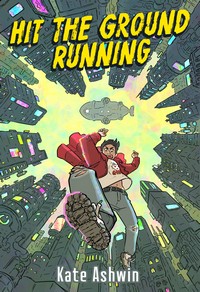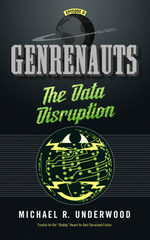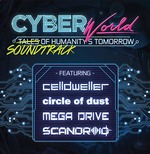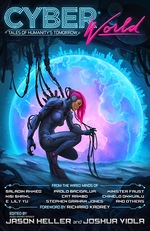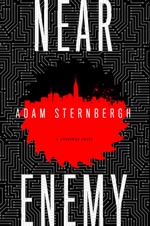Earlier today, I posted my thoughts about Ashwin’s Hit the Ground Running, and now I get the fun of presenting this Q&A with the author Kate Ashwin.
Why don’t you take a moment to introduce yourself to the readers, and tell us about your comics, before hitting us with an elevator pitch for Hit The Ground Running?
Heya! I’m Kate Ashwin, and I’ve been getting away with putting stories on the internet for over twenty years now. Comics-wise, I’ve worked for UK kids’ comics such as The Phoenix and The Dandy, and my (award winning!?) Victorian-era wizardy adventure webcomic Widdershins is entirely free to read online at https://www.widdershinscomic.com/ !
Having worked on a bunch of goofy caper comics, I fancied trying my hand at writing a goofy caper novel, and that’s where Hit The Ground Running comes in! It’s an offbeat cyberpunk heist novel about robbing a megacorp’s Christmas party, and it reads kinda like Leverage, but gayer and with more cyberarms.
I can’t/won’t be the first to ask you about the difference between what you’ve been doing for years and novel-writing. Nor the last. So while apologizing for that, I have to. What was the hardest part about the switch and was that what you expected it to be? Is there a different kind of internal reward to it? (if there’s anything else about the differences/similarities you want to ramble about, go for it.)
Hey, it’s a good question! The biggest thing I kept getting tripped up on was dialogue length, oddly enough. When you’re working with comics, you really have to consider how many words fit in a speech bubble and how many bubbles you can fit onto a page. There’s a real economy of space going on to prevent clutter, so I was finding myself automatically “clipping” dialogue to fit non-existent spaces. Didn’t see that one coming! It’s also difficult to adjust your sense of comic timing to no longer include the visual, a lot of the anatomy of how I traditionally crack a joke is in the break between panels, or the facial expressions of the character, so to switch to using turn of phrase for that instead required some thought.
One of the most rewarding parts was the one I was expecting and hoping for–it’s nice to be able to get into a character’s internal narration a lot more, y’know? When you’re drawing out a scene, unless you’re doing something high-concept, a setting will look the same to the character as to the reader since you have to convey a readable sense of space. But when you’re writing it from a character’s perspective, you really get to play around with what they’re noticing in particular, any internal judgments they may be making, and such. This also applies to how they see other characters, too. Happy to report that it’s exactly as fun as I was hoping!
I could probably talk for days on this question in particular, but I’ll save that rambling for another day.
What was it about this idea—out of all of the dozens likely flitting about your mind—that made you say, “yup, this is what I’m going to spend years(?) and thousands of words on.”
Might be kind of a simplistic answer, but I just love heists. I could write heists for years and never get tired of ’em. There’s something in watching a plan come together (or fall apart) that really tickles my brain nicely.
What came first—these characters (or at least a couple of them) or the world/story?
Renji in particular has been kicking about in my head for quite a while now. I love an impulsive rebel, I love a fast-talker, I love someone who notices something is wrong with the world and sets out to do their bit to change it, and that’s all him! A guy who is going to have to shake off a lot of bad habits, but is sure as hell willing to try.
Hanging the series on a heist crew means you already have roles that need filled–the hacker, the bruiser, the stealth expert- so it’s all about building it out from there. Creating an idea for a character, then layering up little quirks and foibles like a love of plants or zines or french press coffee is one of my favourite things to do. I got to write a scene where everyone’s having tea while planning their heist, and deciding what each of their orders would be is how I get my kicks, it turns out.
The setting came kinda naturally–a cyberpunk version of the UK felt like a fairly obvious leap to make, since that’s pretty much just a step or two away from where I live anyway, and while the ol’ “vertical city as class signifier” deal is not uncommon, it’s still a fun one to play with, and there’s just a hell of a lot to say on that front, unfortunately.
This is the point where I like to ask about a supporting character or two that caught my attention. But I can’t pick just one. Truly. So, if you’re in the mood, you pick one that you want to talk about to highlight for a paragraph or two.
I’d be remiss if I didn’t pick Cadence, really. She and her sister Melody are, through circumstances they don’t wish to explain yet, stuck sharing the same body, and neither of them are having a good time with this arrangement. While Melody is the laid-back type, a hacker with a love of 90s pop and garish clothing, her sister Cadence is a furious mess of energy and punches. Her scenes were fun as I do love to write a good punch-up, and her two cyberarms were a fun addition to the usual brawl, but mostly I enjoyed writing her and Renji sniping at each other. Renji has come from a far more privileged background than Cadence, so she very much views him as some rich boy playing at rebel, fully expecting him to cut and run at the first sign of trouble. Renji doesn’t quite grasp the intricacies of this beyond “the mean lady is yelling at me” which leads to some of that good conflict where both sides have a point, which is always the best kind of conflict.
The core of Cadence is her big tangled ball of feelings- she isn’t some cold combat machine, she’s a conflicted mess in this situation where she isn’t even in control of her own body half of the time, stuck with strong desire for vengeance with nowhere to park it because her enemy is an entire city, and she can’t even talk it out with her sister since they physically can’t inhabit the same room.
It’s no wonder she punches so many people.
In lieu of asking questions about a character, I want to talk about two non-characters a. At what point did you start thinking that Renji carting around a potted plant with him everywhere was a good idea (it was, btw)? Is there, in your mind, a point to it?
Oh man, the plant ended up as more of a running theme than I’d intended. While he wouldn’t admit it, Renji steals the thing from the airship because he’s burdened with an inconvenient amount of empathy, and sometimes that peeks out in unexpected ways. He steals it from the airship, where it ought to be doing well enough in the care of the company, and totes it down to the dark lower levels of the city, where it ends up thriving and cared for in a place where society does not expect things to be able to grow. So, yeah, I never met a phor I didn’t like..!
The plant actually nearly made it onto the cover–one of Ben’s sketches included it, but I decided not to go with that one as it made Renji look like he knew a single goddamn thing about plant care.
The sword—primarily the one Renji carries with him, but beyond that, the culture around these people carrying them. It seems so out-of-place, yet so fitting. Where’d that come from?
Searching for a better answer than “Swords Are Cool”, searching…
Ah, there we go, found one. I had the upper class of this setting carry swords and enact duels because it’s such a ridiculous bit of history that seems to happen whenever there are people with too much cash and not enough to do. There used to be something of a trend for “dueling scars”, to the point where people would even have them added intentionally to their own faces, and that’s just an intoxicating bit of nonsense, isn’t it? It felt kinda right to have that included, but based more around cyber arms, implants, etc. It also leaves a little more room for close combat than an excess of guns might, and simply feels like a more natural fit for a city-state that’s physically attached to the UK.
As for the sword Renji had in this book, it mostly just tickled me to have him steal the thing despite having little to no idea how to use it. Will he get better at swordfighting? I’m led to understand that it takes years of diligent practice, so the odds… are not great.
What’s next for Kate Ashwin, author? Does that depend on the reaction to Hit The Ground Running or are you already neck deep in your next project or five?
The reaction’s been good, but a little quiet- part of that is my insistence on writing for a very quiet genre, though, so that’s on me, but getting an independent book in front of people is even harder than getting an independent comic in front of them, it turns out!
All the same, I have another book or two planned out for this series, and would very much like the encouragement to get stuck in on those. The second one will be from Melody and Cadence’s point of view, and would include corporate espionage, cyborg assassin romance, and infiltrating a robot wars tournament, so obviously I very much do want to write it..!
Otherwise, I’ve been picking at a standalone spy vs spy romance novel; and my webcomic Widdershins is going to be wrapping up in the next year or two with its eleventh and final book, so that is going to be a hell of a feeling. Which feeling in particular, I am not sure, but it will very much be felt.
Thanks for your time and participation! I hope Hit The Ground Running finds its audience—I had a lot of fun with it!
Thank you! So did I!



